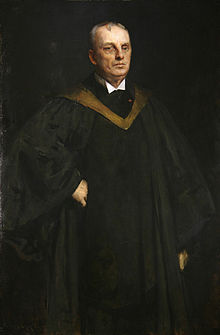Elisha Benjamin Andrews
| Elisha Andrews | |
|---|---|

Elisha Andrews, painted by William Merritt Chase
|
|
| 8th President of Brown University | |
|
In office 1889–1898 |
|
| Preceded by | Ezekiel Robinson |
| Succeeded by | William Faunce |
| Personal details | |
| Born |
January 10, 1844 Hinsdale, New Hampshire, U.S. |
| Died | October 30, 1917 (aged 73) Interlachen, Florida, U.S. |
| Nationality | American |
| Alma mater | Brown University |
| Religion | Baptist |
Elisha Benjamin Andrews (January 10, 1844 – October 30, 1917) was an American economist, soldier, and educator.
Andrews was born in Hinsdale, New Hampshire.
He served in Connecticut regiments during the Civil War as a private and later promoted through ranks to 2nd lieutenant. He was wounded on August 24, 1865 at Petersburg.
Graduating from Brown University in 1870 and from the Newton Theological Institution in 1874, he preached for one year and then was president of Denison University from 1875-79. He was professor of homiletics at Newton Theological Institution from 1879–82; professor of history and political economy at Brown University from 1882–88; professor of political economy and finance at Cornell University from 1888–89; and he served as the president of Brown University from 1889 until 1898. He resigned as president of Brown in 1897 because of criticism by trustees of his advocacy of free silver but at that time withdrew his resignation.
On February 1, 1890, he became a charter member and the organizing president of the Rhode Island Society of the Sons of the American Revolution (RISSAR). He was succeeded in that office later that year by John Nicholas Brown I. Ironically, although both Andrews and Brown were active in organizing the RISSAR, neither formally applied for membership in the organization.
In 1892, he was an American commissioner to the Brussels monetary conference and was a strong supporter of international bimetallism.
...
Wikipedia
